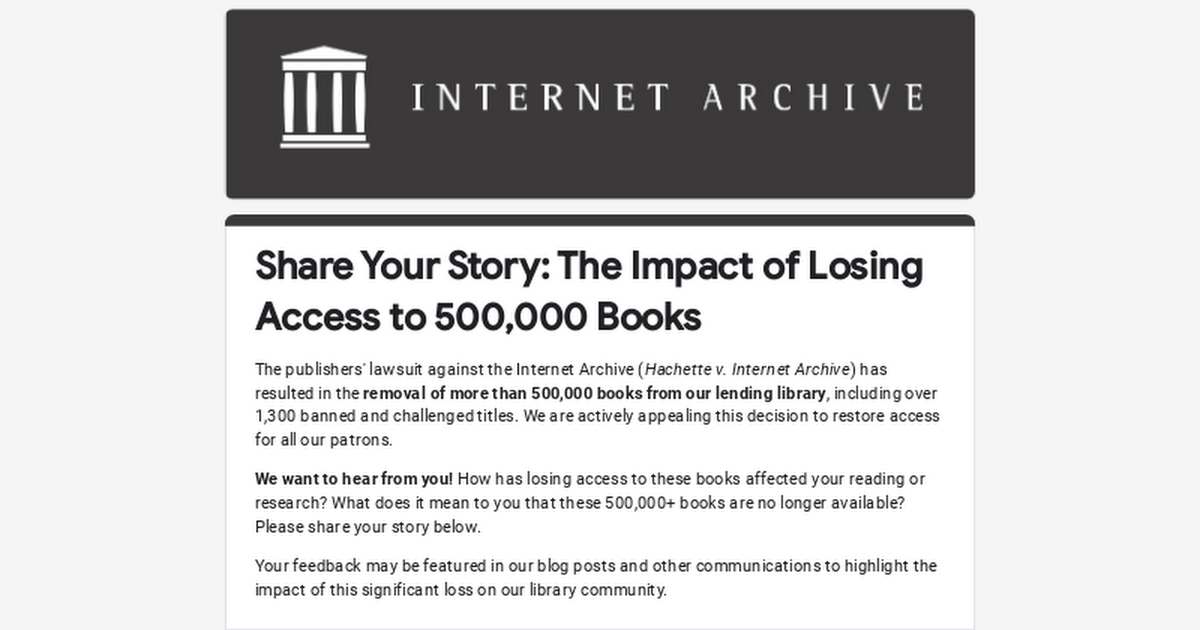It would help if we knew even just a smidgin of what these titles are.
Why does that matter?
To determine the impact of losing access to them.
When I want to pirate books I go to Library Genesis for that so this doesn’t impact me.
What would impact me is if IA loses enough of these lawsuits that the Wayback Machine goes offline. So maybe stop poking the bear, IA?
Perhaps you only care about the wayback machine, but there’s more to the Internet Archive than that, and they shouldn’t be expected to roll over and take it whenever some awful company decides to do a bit of digital book burning.
The linked article is specifically asking what impacts me. I am responding by explaining what impacts me.
Yes, IA has more than just the Wayback Machine. I’m not sure what your point is though. All of that is threatened by these lawsuits. Maybe if preserving that data is important IA should focus on preserving that data. Giving out unlimited copies to everyone is an unrelated secondary goal to preserving archives, so if a big company with a strong legal case comes along and says “stop giving out unlimited copies or we’ll destroy you” then maybe stop giving out unlimited copies.
That’s not “digital book burning.” The opposite, in fact. It’s acting to preserve digital books.
They don’t care about your story of how losing their library of books doesn’t impact you. I’m not sure why that wasn’t obvious to you.
They asked:
We want to hear from you! How has losing access to these books affected your reading or research? What does it mean to you that these 500,000+ books are no longer available? Please share your story below.
There’s no asterisk on that specifying “only answers that favor our lawsuit are desired.”
They are trying to say that people aren’t using it for piracy, that they’re using it for legitimate things like academic study. That’s what they want stories from.
They also aren’t poking the bear, they’re appealing a lawsuit.
The lawsuit was the result of bear-poking. It’s a result of their “National Emergency Library” that they briefly rolled out in 2020 where they took all the limits off of their “lending” and let people download as many copies as they wanted. Was “legitimate academic study” not possible before, with the old limits that weren’t provoking lawsuits?
That is simply a lie.
The Electronic Frontier Foundation (EFF), with co-counsel Morrison Foerster LLP, is defending the Internet Archive against a lawsuit that threatens its Controlled Digital Lending (CDL) program.
The Internet Archive is a nonprofit digital library, preserving and providing access to cultural artifacts of all kinds in electronic form. CDL allows people to check out digital copies of books for two weeks or less, and only permits patrons to check out as many copies as the Internet Archive and its partner libraries physically own. That means that if the Internet Archive and its partner libraries have only one copy of a book, then only one patron can borrow it at a time, just like other library lending. Through CDL, the Internet Archive is helping to foster research and learning by helping patrons access books and by keeping books in circulation when their publishers have lost interest in them.
Four publishers sued the Archive, alleging that CDL violates their copyrights. In their complaint, Hachette, HarperCollins, Wiley, and Penguin Random House claim CDL has cost their companies millions of dollars and is a threat to their businesses.
https://www.eff.org/cases/hachette-v-internet-archive
Why you told a lie that was so obviously false I don’t know.
Here’s the Wikipedia article on the lawsuit. From the opening paragraph:
Stemming from the creation of the National Emergency Library (NEL) during the onset of the COVID-19 pandemic, publishing companies Hachette Book Group, Penguin Random House, HarperCollins, and Wiley alleged that the Internet Archive’s Open Library and National Emergency Library facilitated copyright infringement.
IA was using the CDL without any problems or complaints before the National Emergency Library incident, with the one-copy-at-a-time restriction in place. It was only after they took those limiters off that the lawsuit was launched.
What I said was true.





